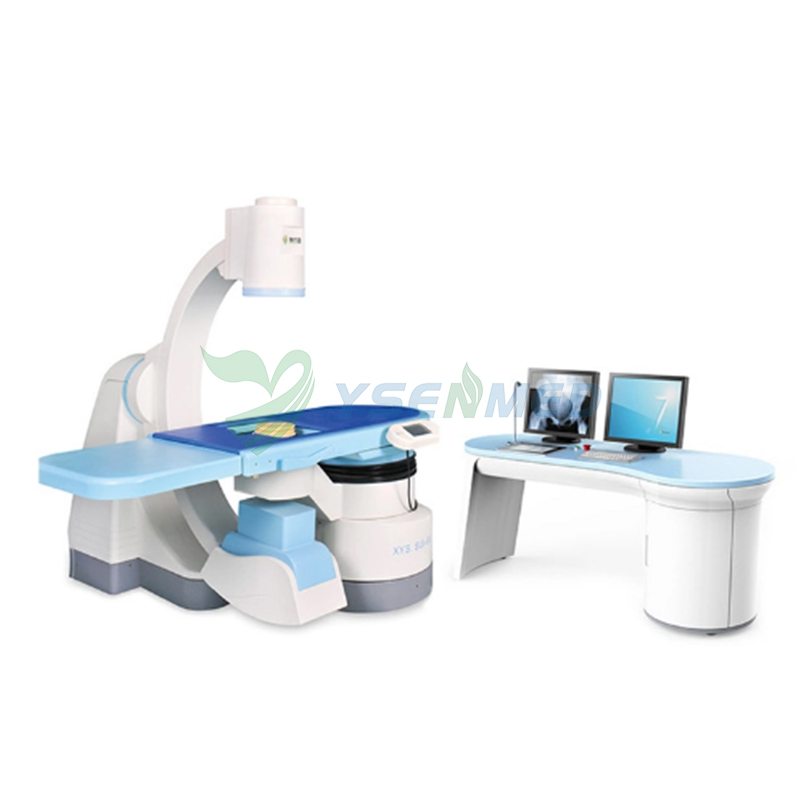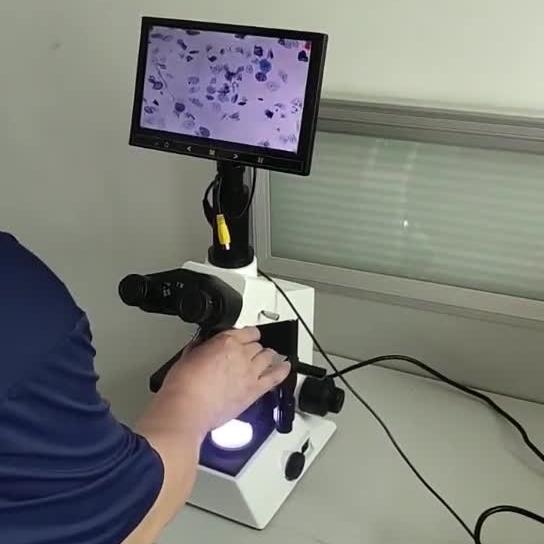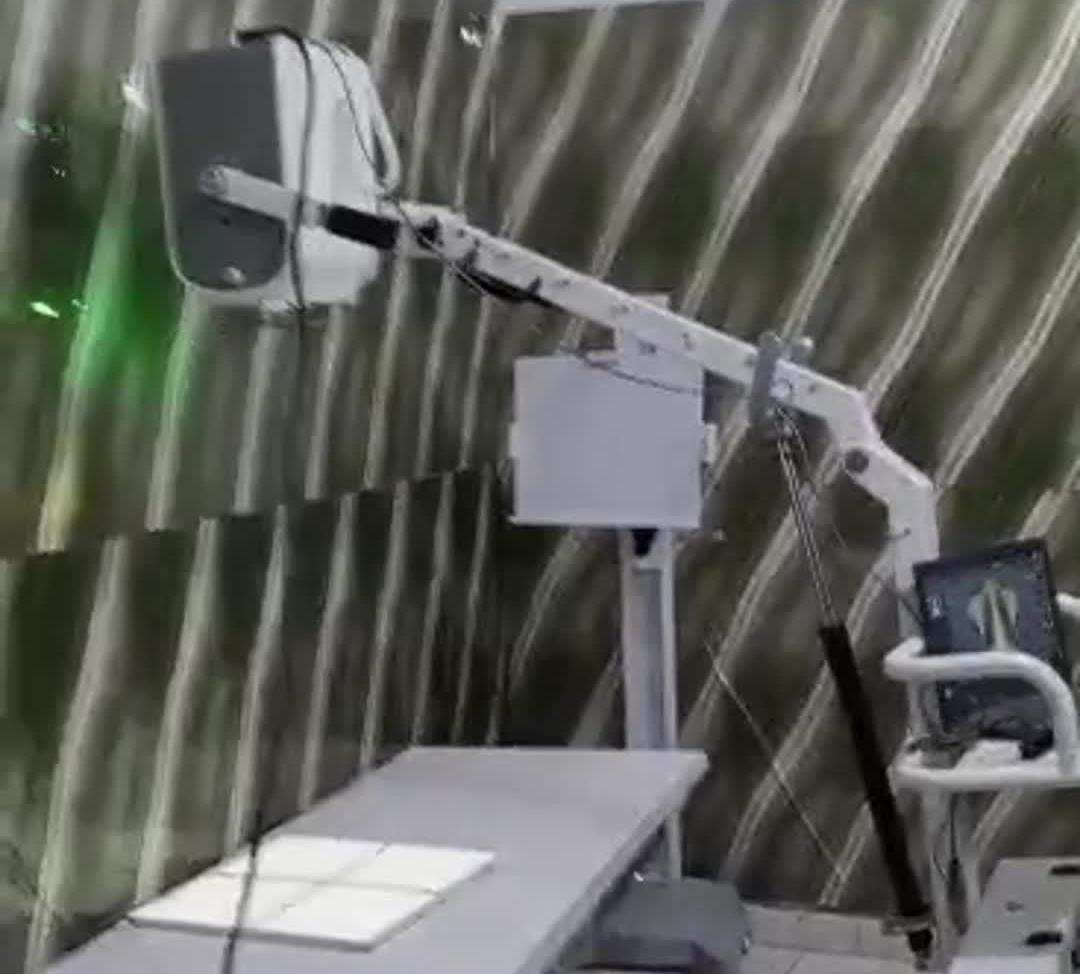Hot Products
YSX500D 50kW DR system set up and put into service in Cambodia.
YSENMED YSX500D 50kW digital x-ray system has been successfully set up and put into service in a hospital in Cambodia.
YSX056-PE serving as a vehicle-mounted x-ray in the Philippines
YSX056-PE 5.6kW portable x-ray unit has been adapted to fit on a truck, to provide mobile x-ray examination service for remote communities in the Philippines.
X Ray Machine To Zimbabwe
x ray machine, 50KW x ray machine
Microscope To Malawi
Achromatic objectives: 4X、10X、40X(S), 100X(S、Oil) Wide field eyepiece: WF10X(WF16X for option) Eyepiece head: Sliding binocular head inclined at 45° Stage: Double layer mechanical stage size 140X140mm, moving range 75X45mm Focusing: Coaxial coarse and
Electromagnetic Extracorporeal Shock Wave Lithotripters: Safe, Effective, and Minimally Invasive
Views : 1888
Update time : 2024-06-28 12:01:00
When it comes to treating kidney stones, there's no one-size-fits-all solution. The good news is that advancements in medical technology have given us a powerful tool in the form of electromagnetic extracorporeal shock wave lithotripters (EMSWLs). These innovative devices are transforming the way we approach this common, yet painful, condition.

What are Electromagnetic Extracorporeal Shock Wave Lithotripters?
Electromagnetic extracorporeal shock wave lithotripters, or EMSWLs, are a type of medical device used to break up kidney stones without the need for invasive surgery. These machines generate high-energy shock waves that are directed at the stone, causing it to fragment into smaller pieces that can then be passed naturally through the urinary tract.
One of the key benefits of EMSWLs is that they are non-invasive, meaning there are no surgical incisions required. Instead, the patient is positioned on a water-filled cushion, and the shock waves are delivered through the skin and into the body, targeting the kidney stone with pinpoint accuracy.
How Do EMSWLs Work?
The mechanism behind EMSWLs is both fascinating and highly effective. At the core of the device is an electromagnetic coil, which generates a rapidly changing magnetic field. This field then induces an electrical current, which in turn creates a shock wave. This shock wave is then focused and aimed at the kidney stone, causing it to break apart into smaller fragments.
The process is further enhanced by the use of imaging technology, such as X-rays or ultrasound, which allow the healthcare provider to precisely locate the stone and guide the shock waves to the correct target. This level of precision is crucial, as it ensures that the surrounding tissue and organs are not damaged during the procedure.
The Benefits of EMSWLs
One of the primary advantages of EMSWLs is their minimally invasive nature. Traditional methods of kidney stone removal often involved open surgery, which can be a lengthy and complex procedure, with a longer recovery time for the patient. EMSWLs, on the other hand, are performed on an outpatient basis, typically taking less than an hour to complete.
Another key benefit is the high success rate. Studies have shown that EMSWLs have a stone-free rate of up to 90% for stones smaller than 2 centimeters in diameter. This means that the vast majority of patients who undergo this procedure are able to pass the fragmented stones without the need for additional interventions.
In addition to the high success rate, EMSWLs also offer a lower risk of complications compared to more invasive procedures. The shock waves are focused and controlled, minimizing the impact on surrounding tissues and organs. This translates to a lower incidence of bleeding, infection, and other complications that can sometimes occur with more invasive treatments.
Finally, EMSWLs are highly cost-effective. By reducing the need for hospital stays and invasive surgeries, these devices can save healthcare systems and patients significant amounts of money over time. This makes them an attractive option for both medical providers and patients alike.
The Safety and Effectiveness of EMSWLs
One of the most important considerations when it comes to any medical treatment is safety. Fortunately, EMSWLs have an excellent track record in this regard, with numerous studies and clinical trials confirming their safety and efficacy.
In terms of safety, EMSWLs are considered a very low-risk procedure. The shock waves are carefully controlled and targeted, minimizing the risk of collateral damage to surrounding tissues. Additionally, the use of imaging technology ensures that the shock waves are delivered with pinpoint accuracy, further reducing the risk of complications.
Regarding effectiveness, as mentioned earlier, EMSWLs have a stone-free rate of up to 90% for smaller stones. This high success rate is due in part to the ability of the shock waves to effectively break down the stones into smaller fragments that can then be easily passed through the urinary tract.
It's important to note, however, that the effectiveness of EMSWLs can be influenced by a variety of factors, including the size, location, and composition of the kidney stone. Larger stones, stones located in certain areas of the kidney, and stones with a harder composition may require multiple treatment sessions or additional interventions to achieve a successful outcome.
Choosing the Right Provider for EMSWL Treatment
When it comes to receiving EMSWL treatment, it's crucial to choose a healthcare provider with the necessary expertise and experience. Look for a urologist or nephrologist who specializes in the use of these devices and has a proven track record of successful outcomes.
During the consultation process, be sure to ask about the provider's experience with EMSWLs, the specific types of devices they use, and their success rates. You should also inquire about the facility's safety protocols and the measures they take to ensure the highest level of care and patient comfort.
It's also important to discuss your individual circumstances and medical history with the provider, as this will help them determine the most appropriate course of treatment for your specific condition. They may also recommend additional tests or imaging studies to further evaluate the kidney stone and develop a personalized treatment plan.
Preparing for EMSWL Treatment
If you and your healthcare provider decide that EMSWL treatment is the best option for you, there are a few steps you can take to prepare for the procedure:
1. Understand the process: Make sure you have a clear understanding of how the EMSWL treatment works, what to expect during the procedure, and any potential side effects or complications.
2. Follow pre-treatment instructions: Your healthcare provider may give you specific instructions to follow in the days leading up to the treatment, such as changes to your diet or medication regimen.
3. Arrange for transportation: EMSWL treatments are typically performed on an outpatient basis, but you may need to arrange for someone to drive you home after the procedure.
4. Manage pain and discomfort: Your provider may recommend over-the-counter pain medication or other strategies to help manage any discomfort you may experience during or after the treatment.
5. Stay hydrated: Drinking plenty of water before and after the procedure can help facilitate the passage of the fragmented stones.
Recovering from EMSWL Treatment
The recovery process following EMSWL treatment is generally quite straightforward. Most patients are able to return home the same day and resume their normal activities within a few days.
During the recovery period, you may experience some mild discomfort or side effects, such as:
- Mild pain or discomfort in the treated area
- Blood in the urine (hematuria)
- Nausea or vomiting
- Fever or chills
These side effects are typically mild and temporary, and can be managed with over-the-counter pain medication, rest, and hydration.
It's important to follow any specific instructions provided by your healthcare provider, such as when to resume normal activities or when to return for follow-up appointments. They may also recommend additional steps to facilitate the passage of the fragmented stones, such as the use of alpha-blocker medications or increased fluid intake.
Conclusion
In conclusion, electromagnetic extracorporeal shock wave lithotripters (EMSWLs) represent a significant advancement in the treatment of kidney stones. These innovative devices offer a safe, effective, and minimally invasive alternative to more traditional surgical interventions, with high success rates and a low risk of complications.
By understanding the benefits and process of EMSWL treatment, patients can make informed decisions about their care and work closely with their healthcare providers to develop a personalized treatment plan that addresses their individual needs. With the right provider and proper preparation, EMSWL treatment can be a game-changer in the management of kidney stones, helping patients to achieve a swift and comfortable recovery.

What are Electromagnetic Extracorporeal Shock Wave Lithotripters?
Electromagnetic extracorporeal shock wave lithotripters, or EMSWLs, are a type of medical device used to break up kidney stones without the need for invasive surgery. These machines generate high-energy shock waves that are directed at the stone, causing it to fragment into smaller pieces that can then be passed naturally through the urinary tract.
One of the key benefits of EMSWLs is that they are non-invasive, meaning there are no surgical incisions required. Instead, the patient is positioned on a water-filled cushion, and the shock waves are delivered through the skin and into the body, targeting the kidney stone with pinpoint accuracy.
How Do EMSWLs Work?
The mechanism behind EMSWLs is both fascinating and highly effective. At the core of the device is an electromagnetic coil, which generates a rapidly changing magnetic field. This field then induces an electrical current, which in turn creates a shock wave. This shock wave is then focused and aimed at the kidney stone, causing it to break apart into smaller fragments.
The process is further enhanced by the use of imaging technology, such as X-rays or ultrasound, which allow the healthcare provider to precisely locate the stone and guide the shock waves to the correct target. This level of precision is crucial, as it ensures that the surrounding tissue and organs are not damaged during the procedure.
The Benefits of EMSWLs
One of the primary advantages of EMSWLs is their minimally invasive nature. Traditional methods of kidney stone removal often involved open surgery, which can be a lengthy and complex procedure, with a longer recovery time for the patient. EMSWLs, on the other hand, are performed on an outpatient basis, typically taking less than an hour to complete.
Another key benefit is the high success rate. Studies have shown that EMSWLs have a stone-free rate of up to 90% for stones smaller than 2 centimeters in diameter. This means that the vast majority of patients who undergo this procedure are able to pass the fragmented stones without the need for additional interventions.
In addition to the high success rate, EMSWLs also offer a lower risk of complications compared to more invasive procedures. The shock waves are focused and controlled, minimizing the impact on surrounding tissues and organs. This translates to a lower incidence of bleeding, infection, and other complications that can sometimes occur with more invasive treatments.
Finally, EMSWLs are highly cost-effective. By reducing the need for hospital stays and invasive surgeries, these devices can save healthcare systems and patients significant amounts of money over time. This makes them an attractive option for both medical providers and patients alike.
The Safety and Effectiveness of EMSWLs
One of the most important considerations when it comes to any medical treatment is safety. Fortunately, EMSWLs have an excellent track record in this regard, with numerous studies and clinical trials confirming their safety and efficacy.
In terms of safety, EMSWLs are considered a very low-risk procedure. The shock waves are carefully controlled and targeted, minimizing the risk of collateral damage to surrounding tissues. Additionally, the use of imaging technology ensures that the shock waves are delivered with pinpoint accuracy, further reducing the risk of complications.
Regarding effectiveness, as mentioned earlier, EMSWLs have a stone-free rate of up to 90% for smaller stones. This high success rate is due in part to the ability of the shock waves to effectively break down the stones into smaller fragments that can then be easily passed through the urinary tract.
It's important to note, however, that the effectiveness of EMSWLs can be influenced by a variety of factors, including the size, location, and composition of the kidney stone. Larger stones, stones located in certain areas of the kidney, and stones with a harder composition may require multiple treatment sessions or additional interventions to achieve a successful outcome.
Choosing the Right Provider for EMSWL Treatment
When it comes to receiving EMSWL treatment, it's crucial to choose a healthcare provider with the necessary expertise and experience. Look for a urologist or nephrologist who specializes in the use of these devices and has a proven track record of successful outcomes.
During the consultation process, be sure to ask about the provider's experience with EMSWLs, the specific types of devices they use, and their success rates. You should also inquire about the facility's safety protocols and the measures they take to ensure the highest level of care and patient comfort.
It's also important to discuss your individual circumstances and medical history with the provider, as this will help them determine the most appropriate course of treatment for your specific condition. They may also recommend additional tests or imaging studies to further evaluate the kidney stone and develop a personalized treatment plan.
Preparing for EMSWL Treatment
If you and your healthcare provider decide that EMSWL treatment is the best option for you, there are a few steps you can take to prepare for the procedure:
1. Understand the process: Make sure you have a clear understanding of how the EMSWL treatment works, what to expect during the procedure, and any potential side effects or complications.
2. Follow pre-treatment instructions: Your healthcare provider may give you specific instructions to follow in the days leading up to the treatment, such as changes to your diet or medication regimen.
3. Arrange for transportation: EMSWL treatments are typically performed on an outpatient basis, but you may need to arrange for someone to drive you home after the procedure.
4. Manage pain and discomfort: Your provider may recommend over-the-counter pain medication or other strategies to help manage any discomfort you may experience during or after the treatment.
5. Stay hydrated: Drinking plenty of water before and after the procedure can help facilitate the passage of the fragmented stones.
Recovering from EMSWL Treatment
The recovery process following EMSWL treatment is generally quite straightforward. Most patients are able to return home the same day and resume their normal activities within a few days.
During the recovery period, you may experience some mild discomfort or side effects, such as:
- Mild pain or discomfort in the treated area
- Blood in the urine (hematuria)
- Nausea or vomiting
- Fever or chills
These side effects are typically mild and temporary, and can be managed with over-the-counter pain medication, rest, and hydration.
It's important to follow any specific instructions provided by your healthcare provider, such as when to resume normal activities or when to return for follow-up appointments. They may also recommend additional steps to facilitate the passage of the fragmented stones, such as the use of alpha-blocker medications or increased fluid intake.
Conclusion
In conclusion, electromagnetic extracorporeal shock wave lithotripters (EMSWLs) represent a significant advancement in the treatment of kidney stones. These innovative devices offer a safe, effective, and minimally invasive alternative to more traditional surgical interventions, with high success rates and a low risk of complications.
By understanding the benefits and process of EMSWL treatment, patients can make informed decisions about their care and work closely with their healthcare providers to develop a personalized treatment plan that addresses their individual needs. With the right provider and proper preparation, EMSWL treatment can be a game-changer in the management of kidney stones, helping patients to achieve a swift and comfortable recovery.
Related News
Read More >>
 Introduction video of YSENMED YSXWJ-BX301B Digital Biological Microscope.
Introduction video of YSENMED YSXWJ-BX301B Digital Biological Microscope.
Apr .01.2025
Here we share the introduction video of YSENMED YSXWJ-BX301B Digital Biological Microscope.
 YSDR-VET320 veterinary DR & YSB-DU10V color ultrasound serving well in Kiram Veterinary Surgery in Uganda
YSDR-VET320 veterinary DR & YSB-DU10V color ultrasound serving well in Kiram Veterinary Surgery in Uganda
Mar .31.2025
Kiram Veterinary Surgery in Uganda shares the clear images they have got from YSDR-VET320 veterinary digital x-ray system and YSB-DU10V vet color ultrasound machine.
 YSENMED YSFPD-R1012C mammo flat panel detector introduced and set up in a hospital in Senegal
YSENMED YSFPD-R1012C mammo flat panel detector introduced and set up in a hospital in Senegal
Mar .30.2025
Senegalese hospital has upgraded its analog mammography x-ray system with YSFPD-R1012C mammo flat panel detector, and the images come out clear.
 YSX-mDR5A 5.3kW mobile DR system working fine in a clinic in Gambia
YSX-mDR5A 5.3kW mobile DR system working fine in a clinic in Gambia
Mar .29.2025
YSENMED YSX-mDR5A 5.3kW mobile digital x-ray unit is working well in a clinic in Gambia.



